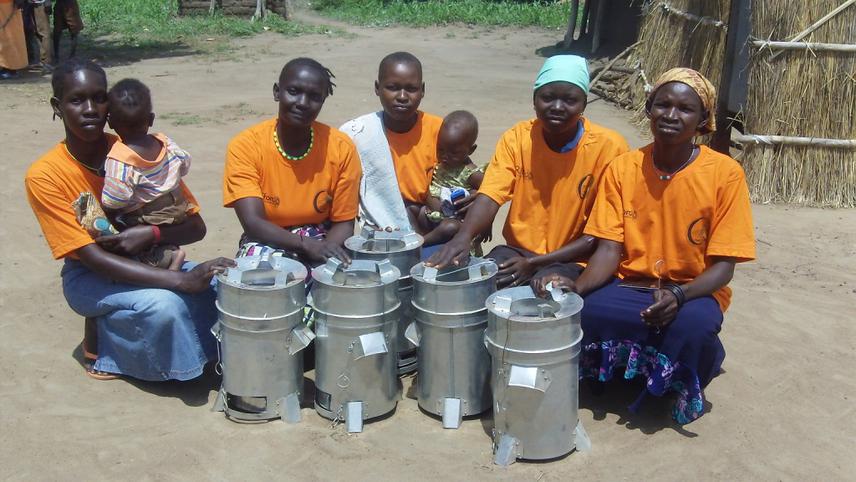Anne Kyomugisha
Empowering Women through Improved cooking stoves will be in one year campaign to respond to women’s gender Rights while at the same time against deforestation in Yei County, one of the most densely populated rural Counties in South Sudan which is facing different problems related to deforestation such as delayed rainfall, soil erosion and high winds due to the high consumption of firewood in traditional cooking stoves and local communities lack knowledge concerning the role of forests in their daily life. Therefore, this project will be sensitizing women about the role of forests and encouraging them to use improved cooking stoves

Some women pose for aphoto after recieving thier ICS.
Development is not possible without access to energy, Energy is vital for women’s development in terms of reducing their time burden for collecting firewood used in cooking and heating, supporting livelihoods activities, improving health and wellbeing and providing opportunities for enterprise and capacity-building.
Conventional energy policies have tended to focus on energy supply, with little attention to the social issues relating to energy. Energy policies miss vital opportunities to ensure projects draw on women’s vital local knowledge and their influencing capacity within households and communities. FOFCOD carried out a research in Yei, Studies show that many rural women spend up to five hours a day gathering fuel and carrying heavy loads. This burden leaves them with little time for productive activities or leisure, puts women and girls at risk of long-term health problems and increases their vulnerability to physical or sexual violence. Spending long hours indoors with traditional wood burning stoves can result in health hazards such as lung disease and eye infections for women and children. The provision of clean cook stoves can mitigate these negative impacts while promoting women’s empowerment, as the time that would have been used to collect fuel can now be used for other productive and economic activities.
Outcomes:
Reduced level of domestic violence against women and primary education enhancement:
The burden of household tasks such as firewood collecting falls primarily on women and children, so by using the ICS the time spent wood seeking will be significantly reduced and cooking times will be much faster. Such changes could help to reduce problems of overworking which are often linked to increased domestic violence. Furthermore it will help to improve the attendance and performance of primary school students who had dropped out of school, or who are failing to perform for reasons such lateness or tiredness.
Decreasing the level of deforestation in the area:
Through encouraging the use of ICS this campaign will reduce the level of household firewood used by up to 90% in more than 900 families built this stove. This project will educate local leaders about the role of forests. Though, the communities have been encouraged to plant more trees in line with national policy. This has not been seriously done.
Saving biodiversity:
By reducing the level of firewood consumption and educating local leaders about the role of forests the movements of people in natural forests will be significantly reduced.